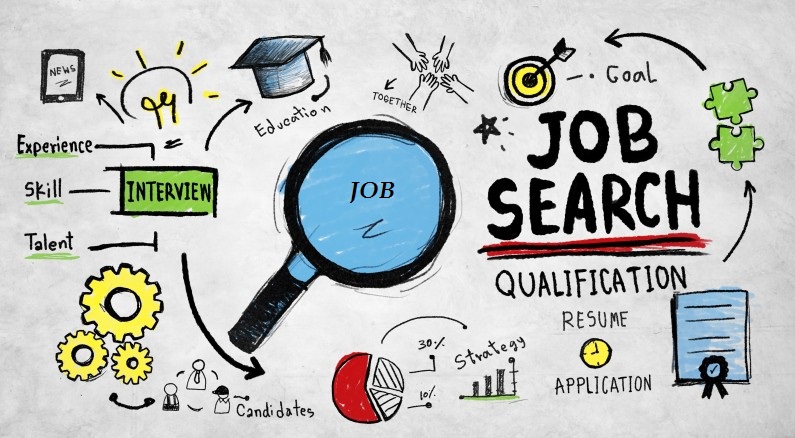


Stressing yourselves and struggling to grab the dream job is not that tough today if you carry confidence, knowledge and most importantly when you are a team player with all the skills in you. You need to stand in the competition and it can be strong when applying and be interviewing for your dream job. But it cannot be a stop to anyone when you have the desired skills. It’s a pretty rare thing that you are the only candidate for a job, in those cases, you will be approached by a company anyway, be rest assured and face the questions and the completion of the interview process. Try to get the edge on the other candidates who are with you by analyzing their skills and if they carry any extra degree. But how to do that is what we are speaking out on this blog. Try these simple ideas — here are some ways to help you stand-out from the other candidates.
Your Curriculum Vitae (CV)

Reaching out the consultancy or an employer is essential and the first challenge for anyone to get their dream job. But, this will only happen when your CV represents you better than what you are. This plays a vital role to get an interview call or a mail, and then it’s your task to present yourself and grab the job. Make sure that your CV is tailored to the job spec ified and the role offered.
Don’t Fail to prepare & prepare well to fail

Once your interview is secured, and you are all set to join your dream job. Set aside time to prepare well and try to get all the relevant information about the company you are joining. This is the exercise you need to follow before you are hitting the interview and the time you are joining the company too. Before you are hitting the interview you need to make a note of the company’s history, teams, what are they into and what they do to others?
STAR Method

This is a simple method, which will help you to answer the most challenging and competency based questions. Today organizations are very keen to know what was the situation that you have met, how did you deal with it and what was the solution you gave. This is the stage you can prove yourself and how your employer did grade you to be the best player.
A situation or Task: Describe the situation you were confronted or the task; that you needed to accomplish in a shorter time.
Action: Brief how you reacted towards the situation and what you did; this is where the interviewer will be looking for the explanation and how you used skills and attribute that they are testing. Make sure that you take the personal approach as the interviewer needs to hear about your actions, not the teams.
Result: Explain how it all ended. Use this as an opportunity to describe what you accomplished and learned from the situation.
Appearance

No matter what the role is or the organization you are attending; remember that for all little things you need to pay. Make sure for the grammar check, spell check in your CV and what you are wearing. Do not select the clothes which make you feel sick, wear right clothes that fit you the best.
Most of the people aren't going to notice the difference, but some will, of course, do it; but don't go to impress people, which will land you somewhere else. The most important thing is to look professional. Tattoos covered up. One pair of earrings for women; or none is also fine, no earrings for men. No facial piercings at all .
Attitude

Your attitude plays everything when you are facing interviewer. Carry positive body language and attitude. Greet, smile and give the interviewer a firm handshake when you meet him or her. Make eye contact and actively engage with the interviewer, and lean slightly towards the interviewer to show your engagement in the conversation. Do not look up or down, not even to the sides of the interviewer when speaking, as this can be interpreted as disinterest or apathy. Thank the interviewer sincerely for the time and opportunity and express your excitement about the employment possibility.
...
Read More

As a head, it’s the manager’s role to encourage his employees to surpass their expectations by taking responsible risks. An efficient leader can either embrace diverse thinking to measure one’s talent to innovate or distract the whole team to fall down. Never undervalue an employee’s ability as it will break the employee to perform. Have proper understanding before you evaluate or test your employee's abilities and potential.
A manager or a head should carry the skill to motivate his employees; as this is one of the greatest skills an entrepreneur should hold while leading a process or a team. Every organization goes through some tough growing pains, and this may be because of many reasons; like lack of infrastructure, resources, or cash would also make it extremely difficult to improve the company morale, but cash should not be a reason to discourage your employees. Even if you are wealthier, don’t show the money, which will not work.
Let us look at some better ways to boost the morale.
Be Kind & Praise
Everyone wants it and this is one of the greatest and easiest things to give. A praise from the CEO goes a lot beyond then you might think, but a small appreciation from the head is a good gesture to any employee. Praising every improvement that you see in your team members make them happy for sure, but it also increases their confidence and love towards their work.
Get Divest of the Managers
Can we not think any project without a project manager in any organization? That doesn’t seem to be happening also? But can we try it? Putting aside a project lead or a manager and empowering your staff to work together as a team rather than everyone reporting to one individual can do wonders. But which organization will think about it? The question here is what’s worse than letting your supervisor and your team down?
A manager or a supervisor will help or make the people to work together as a team, and this will often produce better projects faster. If the team is strong and united all the team members will enjoy the work and like to come in early, stay late, and devote more of their energy to solving the problems and deliver the project as estimated.

Respect their Ideas
Instead of always being the boss and telling people what they need to do. Make them share their ideas and see if that may work well. People hate being told what to do; they like others to respect their ideas and this has also worked well in many scenarios. You can add your idea to what they say to mix the ideas and promote them or proceed.
Do Not Criticize or Correct
No one will be ready to take criticism or corrections in their work. This will not only de-motivate them but also pull them down, which is not a good task for any organization. Try different options to explain to them why it will not work. Or you can even take an indirect example to get people learn and improve, from their mistakes, and fix them at the earliest. Ask, instead of pointing them for the mistakes you can ask them the best way to approach the problem and how best you can fix it.
Treat as Leaders
Making everyone leaders may sound different, but it’s not making them leaders, but making them feel that you give importance to their decision and respect it. Have top performers’ get introduced in the teams and organization and highlight their performance and strengths to let them know that because of their excellence, you want them to be the example for others. Set-up appreciations and calculation bars to show-up their performance; which will motivate them to live up to their reputation as leaders.

Give a Surprise
Take your team out and have a good talk. Introduce new policy which will help them and company grow. This is an easy way to remind them that you notice and appreciate their work and this may also help others to be close to the team and think what they are missing out.
Rewards & Recognitions
Both of them play a vital role in motivating your employees. This is an old technique, but believe me, it works wonders. When an organization thing or recognize their employee's performance and it is rewarded its self-makes your employee feel positive about their company. Announce their performance in front of teams, or stick on whiteboards or treat them with goodies. You can do this every quarter or by the half of the year. Start reward and recognition policy which will help the organization to walk closer with their teams.
Have Company Get Together
Doing things as a group will not help in many scenarios, instead, plan for a company get together once in a while; as this can go a long way. Have a company picnic or anniversary. As many companies are even missing their anniversaries due to lack of time. Holding happy hours is a good idea now and then; don’t wait for holidays to do such activities. Organize events once in a year or the time your project is out will remind your staff that you’re all in it together.
Share the Rewards
When your company does well or your project is success start celebrating it. Do not postpone your reward as this will be the best time to let everyone recognize your efforts. You can share the project in and out and if you have any disappoints too with the teams. share your future plans how you want them to support you.
...
Read More

The Internet of Things (IoT) has quickly turned out to be one of the most adapted and maybe, most advertised jargons across IT & ITES industry. However, it is completely defensible and is backed up by the numbers. Beyond of its extensive range of benefits, the state of the art of this trend being involved in the IT sector is inevitable.
The IoT of things are not all-purpose devices, such as smartphones and computers, but dedicated objects, such as vending machines, jet engines, connected soap dispensers and many other countless examples.
IoT will have a great impact on the economy and many enterprises will look into transforming their businesses into digital and facilitate their business models by improving efficiency to generate good ROI. It’s a tradition that enterprises always look up for successful trends and for sure Industries are looking at IoT, but the implementation is still premature. Even though there is some immaturity, but there is still some evidence of planned uses across a wide range of industries. We may find an answer from these existing evidence to the question of the hour, what needs to be done to build IoT at the enterprise level.
Sensors
Objects that contain sensors found useful in all studies, for example, you can fix a sensor to the products in a grocery store and if the item is spoiled it will give you a buzz to replace the item, the cost of purchase and installation of a sensor is relatively cheap and it also reduce the stress on the workforce.
Connectivity
You can always stay connected to your IoT device via your smartphone or through a hub or the device itself contains the Internet connectivity.
Processors
Without a processor there is no computing or a smart device. IoT devices will have capabilities of computing and storing relevant data passed on to it. There is a need to equip these devices with some useful features, so there is a need of advanced processors equipped with these devices.
Energy-efficiency
Think about the high-end business models, where there will a lot of flow of customer and immense pressure on your workforce, you need a device which has the conservative amount of energy, which will not ask you for a battery charger or replacement battery during peak hours.
Cost Effectiveness
The Business goal of IT companies is providing the users with the technology and features that they needed the most. However, there will be a significant cost for maintaining and supporting the user’s technology. IoT is the answer to reducing the signification cost and ensure flawless deliverability in the IT process or project.
Quality Standards
You need to operate your devices under harsh outdoor atmospheric conditions for a long time. There should be proper parameters and quality checks on the (IoT) devices produced by the industries.
Security
Securing your device or network is a critical mission, Devices that are associated with a network through IP’s have immense threats of being hacked/spoofed. Managing ID’s and access, saving the databases are critical to the triumph of the IoT. However, traditional approach and old school techniques cannot cope with the complexity that the IoT needs from the enterprise. It is the time for Business leaders and technology giants to reconsider their approach towards cyber security, and they should raise the curtains for the new set of security rules.
...
Read More

Whenever we go for any interview, it is ever time we think that what is going to happen and what questions do we need to answer. In my few years of experience, I have found few questions to be best to ask in an interview. “It’s not about me, though, it’s about you”. Here are those questions you need to ask in a job interview. I have put this list collectively because so often we can forget what an interview’s all about. It sure feels like it’s about you, but it’s really not.
An interview is in fact about how you can help your future superior and future employer succeed. You can find out what their requirements and hopes are and are they matching up with your background and experience with what they need.
Overlooking these basic specifics about the interview is easy. There will be much else going on in your work, your life, and in your job search, so you often miss out these basic things which will result very bad from the interviewer’s point of view; which is not at all a good sign for you.
Look into some conversations in between, and explore what will you get when you ask meaningful questions.
When I asked how do I get a “gold star” when an evaluation is going on, the interviewers’ faces lit up!” You will never know where it will land you, but I can tell, if you ask such meaningful questions at the end, you may get a positive result.
Ask the interviewer about his leadership style and reward system, he will feel good and his face lit up like a Christmas tree, and land you in great.
After he answers the question, say “how can I help you receive your next promotion?”, he will begin to give you advice on how you should negotiate for a higher starting salary.
And that’s exactly the point. By asking these type of questions, which focus on the needs, personality, and preferences of your future boss and future employer, you’re demonstrating that you are somebody who is genuinely interested in their well-being. And the more interest we show in others, the more promise they show to aiding our cause.
Let’s go into the topic and look at best interview questions. My aim here is to arm you with easy-to-ask, revealing-to-answer questions for you to take with you to an interview:

I hope you find these questions useful in your interviews!
...
Read More

Use social media to make your job search more effective and efficient. We can see that social media profiles have become an important part of our everyday life, whatever technology or platform you choose you’re likely to have a few different accounts online. You can create your own brand by making your profiles online, especially when working in digital it is very important to realize what you add online!
Dos

Don'ts
As long as you’re conscious about what you put online, you’re on the right track! If you have any questions, don’t be shy! Head over to our LinkedIn, Twitter, Facebook or Google+. We practice what we moralize!, and drop us a line!
...
Read More